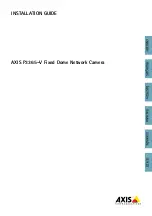
25. Spanning Tree
ROX™ v2.2 User Guide
248
RuggedBackbone™ RX5000
Edge ports are ports that do not participate in the Spanning Tree, but still send configuration
messages. Edge ports transition directly to frame forwarding without any listening and learning
delays. The MAC tables of Edge ports do not need to be flushed when topology changes occur
in the STP network. Unlike an STP-disabled port, accidentally connecting an edge port to another
port in the spanning tree will result in a detectable loop. The 'Edgeness' of the port will be switched
off and the standard RSTP rules will apply (until the next link outage).
Admin Point-to-Point
Synopsis: string - one of the following keywords { auto, forceFalse, forceTrue }
Default: auto
RSTP uses a peer to peer protocol that provides for rapid transitioning on point-to-point links. This
protocol is automatically turned off in situations where multiple STP bridges communicate over a
shared (non point-to-point) LAN. The bridge will automatically take point-to-point to be true when the
link is found to be operating in full-duplex mode. The point-to-point parameter allows this behavior
or overrides it, forcing point-to-point to be true or false. Force the parameter true when the port
operates a point-to-point link but cannot run the link in full-duplex mode. Force the parameter false
when the port operates the link full duplex, but is still not point to point (e.g. a full-duplex link to an
unmanaged bridge that concentrates two other STP bridges)
Restricted Role
If enabled, causes the port not to be selected as the root port for the CIST or any MSTI, even it has
the best spanning tree priority vector. This parameter should be FALSE by default.
Restricted TCN
If TRUE, causes the port not to propagate received topology change notifications and topology
changes to other ports. This parameter should be FALSE by default. If set it can cause temporary
loss of connectivity after changes in a spanning tree's active topology as a result of persistent
incorrectly learned station location information.
RSTP Priority
Synopsis: string - one of the following keywords { 240, 224, 208, 192, 176, 160, 144, 128, 112,
96, 64, 32, 16, 0 }
Default: 128
The STP port priority. Ports of the same cost that attach to a common LAN will select the port to
be used based upon the port priority.
STP Cost
Synopsis: string - the keyword { auto-cost }
Synopsis: unsigned integer
Default: auto-cost
The cost to use in cost calculations, when the cost style parameter is set to STP in the bridge
RSTP parameter configuration. Setting the cost manually provides the ability to preferentially select
specific ports to carrytraffic over others. Leave this field set to 'auto' to use the standard STP port
costs as negotiated (four for 1Gbps, 19 for 100 Mbps links and 100 for 10 Mbps links). For MSTP,
this parameter applies to both external and internal path costs.
RSTP Cost
Synopsis: string - the keyword { auto-cost }
Synopsis: unsigned integer
Default: auto-cost
The cost to use in cost calculations, when the cost style parameter is set to RSTP in the bridge
RSTP parameter configuration. Setting the cost manually provides the ability to preferentially select
specific ports to carry traffic over others. Leave this field set to 'auto' to use the standard RSTP
















































